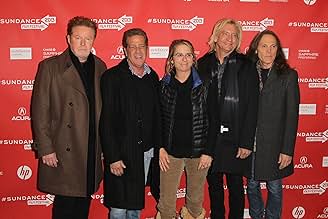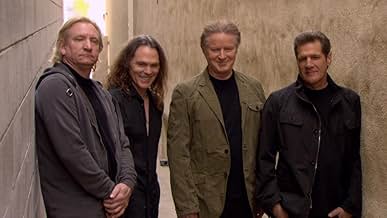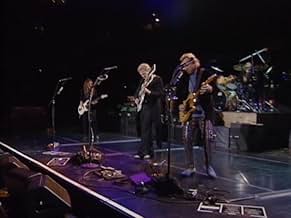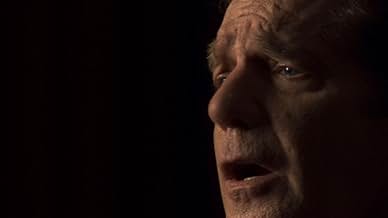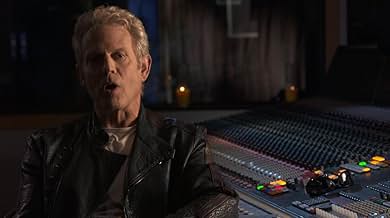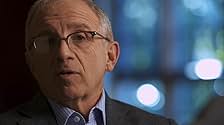IMDb RATING
8.2/10
2.9K
YOUR RATING
The life and times of the super successful American soft-rock band, Eagles.The life and times of the super successful American soft-rock band, Eagles.The life and times of the super successful American soft-rock band, Eagles.
- Won 1 Primetime Emmy
- 3 wins & 1 nomination total
Browse episodes
Featured review
One might think that should there ever be a Mount Rushmore of country rock, they may well etch the faces of the Eagles into the cliff side. However, they might need some time, for there have been quite a few comings and goings and line-up changes in camp Eagles over the years. This documentary ventures into the first chapter of the band's existence and provides evidence of the rifts, drifts, differences and fallouts that have occurred. It is probably fair to say that the Eagles are one of the most notoriously disharmonious of bands, who inexplicably and ironically orchestrate some of the most harmonious musical harmonies of any group since CSN. It is still a struggle today to meet a band that matches up vocally.
Although they may not straddle the earth with an omnipresence that marked their original inception and 1970s heyday, the reformed country rockers are still synonymous with classic radio and the rock album format.
Running at 2 hours, there is a lot of ground to cover. For a casual viewer, there is a mercifully breezy skip through respective childhoods and the pace is pushed with momentum towards the inspiring and prolific late-60s underground music scene of LA that homed residencies of Poco, Buffalo Springfield, Joni Mitchell, Jackson Browne, Linda Ronstadt et al. There is acknowledgment as to the creatively incestuous backdrop of the times, of the area and of the era. The sort that enabled artists to shift, move and collaborate seemingly at will. As the late 60s moved into the early 70s and success increased for the bulk of the aforementioned artists, it is clear that all look back with giddy rose-tinted glasses of nostalgia. The creativity was clearly as intoxicating as the drugs that they were recreationally self-medicating.
The Eagles were always a band that stood apart from their peers. They did so for a few reasons. One, is that they were massively successful in a way that the others could only dream of, another is that they had a steely core that made them efficiently consummate and business-like. Both of these aspects are highlighted by the documentary. The band reflect openly upon their motivations and inclinations, with a mix of new interviews and footage that dates back to the period. To see how much and how little they've changed is part of the joy of the feature. Around the mid-point, Joe Walsh arrives into the frame and is spotlighted in both the past and the present as an impassioned guitarist who is part-talent, part-court jester. His phrasing exudes a humorous hybrid of Keith Richards and Stephen Stills along with a healthy dose of his own breezy personality. For a music film, the tone is more or less consistently serious throughout, so his appearance offers some light hearted respite.
On the downside, there is not as much insight into the studio processes as a fan may want, but the band members are all given a fair hearing from both time periods and talk candidly about being in the epicentre of the Eagles whirlwind.
Understandably, Part One ends on a decisively sour note; their downfall and break-up. Although the pressures of topping the totemic Hotel California engulfed them all to a certain extent, it is clear that decisive fractures of the intragroup relationships had crippled the band. It is also evident that the distractions around the process was a demon that gobbled them up. Power may corrupt and absolute power may corrupt absolutely, but I am sure there is a pithy equivalent for success. Life in the fast lane had brought this group crashing into a ditch.
This is a tale that has enough acrimony to give Pink Floyd a run for their money. They may have been back together since 1994, as they will happily testify, but in case you're wondering, they only speak to Don Felder through lawyers. Some things don't change and won't be taken easy.
Although they may not straddle the earth with an omnipresence that marked their original inception and 1970s heyday, the reformed country rockers are still synonymous with classic radio and the rock album format.
Running at 2 hours, there is a lot of ground to cover. For a casual viewer, there is a mercifully breezy skip through respective childhoods and the pace is pushed with momentum towards the inspiring and prolific late-60s underground music scene of LA that homed residencies of Poco, Buffalo Springfield, Joni Mitchell, Jackson Browne, Linda Ronstadt et al. There is acknowledgment as to the creatively incestuous backdrop of the times, of the area and of the era. The sort that enabled artists to shift, move and collaborate seemingly at will. As the late 60s moved into the early 70s and success increased for the bulk of the aforementioned artists, it is clear that all look back with giddy rose-tinted glasses of nostalgia. The creativity was clearly as intoxicating as the drugs that they were recreationally self-medicating.
The Eagles were always a band that stood apart from their peers. They did so for a few reasons. One, is that they were massively successful in a way that the others could only dream of, another is that they had a steely core that made them efficiently consummate and business-like. Both of these aspects are highlighted by the documentary. The band reflect openly upon their motivations and inclinations, with a mix of new interviews and footage that dates back to the period. To see how much and how little they've changed is part of the joy of the feature. Around the mid-point, Joe Walsh arrives into the frame and is spotlighted in both the past and the present as an impassioned guitarist who is part-talent, part-court jester. His phrasing exudes a humorous hybrid of Keith Richards and Stephen Stills along with a healthy dose of his own breezy personality. For a music film, the tone is more or less consistently serious throughout, so his appearance offers some light hearted respite.
On the downside, there is not as much insight into the studio processes as a fan may want, but the band members are all given a fair hearing from both time periods and talk candidly about being in the epicentre of the Eagles whirlwind.
Understandably, Part One ends on a decisively sour note; their downfall and break-up. Although the pressures of topping the totemic Hotel California engulfed them all to a certain extent, it is clear that decisive fractures of the intragroup relationships had crippled the band. It is also evident that the distractions around the process was a demon that gobbled them up. Power may corrupt and absolute power may corrupt absolutely, but I am sure there is a pithy equivalent for success. Life in the fast lane had brought this group crashing into a ditch.
This is a tale that has enough acrimony to give Pink Floyd a run for their money. They may have been back together since 1994, as they will happily testify, but in case you're wondering, they only speak to Don Felder through lawyers. Some things don't change and won't be taken easy.
- gregwetherall
- Apr 27, 2013
- Permalink
Storyline
Did you know
- TriviaThe documentary includes interviews from all seven members of the band through the decades
- GoofsGlenn Frey claims that "Take It To The Limit" was the Eagle's first number one record. In fact their first number one record was "Best of My Love" released over a year before.
- ConnectionsFeatured in 2013 Primetime Creative Arts Emmy Awards (2013)
- How many seasons does History of the Eagles have?Powered by Alexa
Details
- Release date
- Country of origin
- Language
- Also known as
- La historia de los Eagles
- Production company
- See more company credits at IMDbPro
- Runtime1 hour 34 minutes
- Color
Contribute to this page
Suggest an edit or add missing content

















